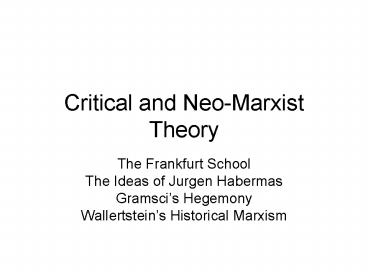Critical and NeoMarxist Theory - PowerPoint PPT Presentation
1 / 19
Title:
Critical and NeoMarxist Theory
Description:
Early critical theorists drew on Marx (especially concept of alienation) ... Put Marx's ideas into critical framework. Shift from materialism to idealism ... – PowerPoint PPT presentation
Number of Views:201
Avg rating:3.0/5.0
Title: Critical and NeoMarxist Theory
1
Critical and Neo-Marxist Theory
- The Frankfurt School
- The Ideas of Jurgen Habermas
- Gramscis Hegemony
- Wallertsteins Historical Marxism
2
Intellectual Roots
- Early critical theorists drew on Marx (especially
concept of alienation) - Also influenced by ideas of Hegel, Nietzsche, and
Freud - Emphasized link between macro-level processes
such as culture and effects on individual psyche
and consciousness
3
Frankfurt School (1923)
- Ideas developed by Max Horkheimer, Theodor
Adorno, Herbert Marcuse, and Erich Fromm - Two main ideas
- 1. all ideas influenced by the current times and
by prevailing thought patterns - 2. cannot separate facts and values need to be
self-reflexive and self-critical and develop a
critical stance toward society
4
Frankfurt School (cont.)
- Linked culture to personality formation
- Looked at how ideology of capitalism and
alienation warp the individual personality - Developed critique of mass cultur e
- Noted use of popular culture to manipulate
individuals - Standardization of taste
- Distraction from real world
- Encourages passiveness
5
Jurgen Habermas (1929 - )
- Studied philosophy
- In 1956 became Theodor Adornos assistant at
Heidelberg - Adorno wrote The Authoritarian Personality
1950 linked prejudice and anti-Semitism to
authoritarianism - Habermas became chair of philosophy at Frankfurt
1964
6
Habermas (cont.)
- Put Marxs ideas into critical framework
- Shift from materialism to idealism
- Added Webers rationalization, Durkheims
consensus, Parsons value generalization - Emphasis on communicative action and the
generation of ideology
7
Legitimation Crisis (1975)
- Society developed through qualitatively different
stages - Primitive
- Traditional Civilizations
- Modern Civilizations
- Class Societies Capitalist Liberal
- - Organized Capitalist Post-Capitalist
- Post-Modern
8
Legitimation Crisis (cont.)
- Marx said change developed out of contradictions
in material base - But Habermas says change occurs out of
contradictions in ideas and how they are
legitimated through norms and values - Legitimation new set of norms and values used
to justify the system - Consensus breakdown societal crisis
9
Legitimation Crisis (cont.)
- Traditional societies breakdown of religious
norms and values led to idea of rational exchange
between equals - Early liberal capitalism doubts re market
ideology of led to organized capitalism - Need for formal legitimations based on reason
and rationality - legitimation crisis occurs
10
Legitimation Crisis (cont.)
- Legitimation part of socialization process in
lifeworld through communicative action - The norms we use to justify the truthfulness of
our communicative acts are the same norms that
are used to justify the system - Change in legitimation system change in
lifeworld - Increasing rationalization
- Necessitates consensus about norms (Durkheim) and
value generalization (Parsons)
11
Reason and Rationality
- Two types of action and rationalization
- 1. purposive-rational action using means-end
rationality - 2. communicative action using reason
- First type used by capitalist system
- Now we need to move to second type
12
Communicative Action
- Ideal speech no barriers (i.e. coercion)
- Consensus about truth developed through
communication process - Ideal speech has 4 criteria
- 1. understandability of utterances
- 2. truth of utterances
- 3. reliability and sincerity of speaker
- 4. authority (right to offer ideas)
13
Criticism of Habermas
- Too idealistic
- Total consensus impossible
- Do all speakers have equal ability?
- How will conflict be handled?
14
Marxism and Neo-Marxism
- Variants of Marxism
- Hegelian Marxism (Antonio Gramsci)
- Neo-Marxian Economic Theory (Braverman)
- Fordism and Post-Fordism
- Historical Marxism
- Analytical Marxism
- Post-Modern Marxian Theory (Laclau / Mouffe)
15
Gramsci and Hegemony
- Italian Marxist
- Co-founder of Italian Marxist Party
- Analyzed political situation in Italy
- The Prison Notebooks 1929-1935
- Cultural leadership and domination used by ruling
party of a society - Domination through ideology rather than force
16
Hegemony
- Hegemony uniting persuasion from above with
consent from belowit is done by the dominant and
collaborated in by the dominated - Intellectuals need to ally selves with
revolutionary party rather than ruling party to
lead masses to power
17
Immanuel Wallerstein and World Systems Theory
- Extension of Marxs historical materialism
- Looks at global historical change rather than
societal historical change - Two world systems so far
- 1. World Empire
- - political and military domination
- 2. Modern Capitalist World Economy
- - global economic division of labour
18
Modern Capitalist World Economy
- Core countries
- -Exploit rest of system
- - free labour market skilled and supervisory
- Semi Periphery
- - has industry set up by core
- - sharecropping
- 3. Periphery
- - provide raw materials and labour for core
19
Future World System
- Socialist world government
- All labour will be free labour

